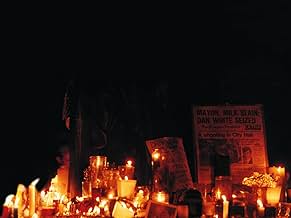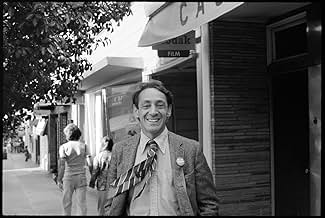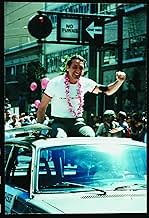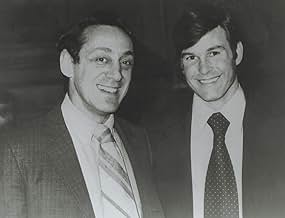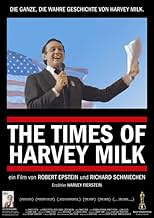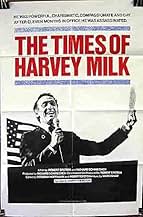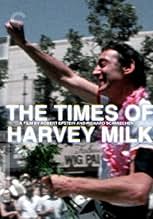CALIFICACIÓN DE IMDb
8.2/10
6.7 k
TU CALIFICACIÓN
Agrega una trama en tu idiomaA documentary of the successful career and assassination of San Francisco's first elected gay city supervisor.A documentary of the successful career and assassination of San Francisco's first elected gay city supervisor.A documentary of the successful career and assassination of San Francisco's first elected gay city supervisor.
- Ganó 1 premio Óscar
- 11 premios ganados y 2 nominaciones en total
Harvey Milk
- Self
- (material de archivo)
John Briggs
- Self
- (material de archivo)
Jerry Brown
- Self
- (material de archivo)
Jimmy Carter
- Self
- (material de archivo)
Dianne Feinstein
- Self
- (material de archivo)
- (as Mayor Dianne Feinstein)
David Fowler
- Self - TV Interviewer of Dan White
- (material de archivo)
Joseph Freitas
- Self
- (material de archivo)
Terence Hallinan
- Self
- (material de archivo)
George Moscone
- Self
- (material de archivo)
- Dirección
- Guionistas
- Todo el elenco y el equipo
- Producción, taquilla y más en IMDbPro
Argumento
¿Sabías que…?
- TriviaSelected for preservation by the National Film Registry in 2012.
- ErroresWhen describing Harvey Milk's murder, the narrator states that Dan White killed Milk in Milk's own office. In reality, White asked Milk to come into White's former office, closed the door, blocked it with his body, and shot Milk.
- Citas
[last lines]
Harvey Milk: I know that you cannot live on hope alone, but without it, life is not worth living. And You... And You... And You... Gotta give em hope. Thank You very much.
- Bandas sonorasYou Make Me Feel (Mighty Real)
Performed by Sylvester
Written by Sylvester & James Wirrick (as Tip Wirrick)
Tim McKenna (Borozi Music Artists)
Fantasy Records
(c) 1978 Rights Donated
Opinión destacada
The title of this excellent documentary is well chosen, since it is as much about a time and a place as it is about Harvey Milk. The time is the late 1970s and the place is San Francisco. After quickly covering some biographic details the movie concentrates on Milk's campaign to get elected to the San Francisco Board of Supervisors. After three unsuccessful attempts he wins, becoming the first openly gay man to be so elected. As much of a breakthrough as that was, it must be kept in mind that Milk was elected representing a heavily gay district.
Things have changed a lot in thirty years, since some U.S. congressmen are now openly gay. But the issue of acceptance of homosexuality is still contentious, as proved by the passage in 2008 of Proposition 8 that changed the California Constitution to ban gay marriage. This documentary is relevant since it shows where things started to change.
A good part of the film is devoted to consideration of California's Proposition 6 that was put before the public in 1978. Proposition 6 would have banned gays and lesbians from working in public schools. Of course Milk was heavily involved in opposition to the Proposition and it was a peak moment for him and the gay community when the proposition failed. The filming of the celebration of this in the gay community is a high point of the film.
It was only shortly after the defeat of Proposition 6 that Milk and San Francisco Mayor George Moscone were assassinated by Dan White, a fellow supervisor who had recently resigned, but was seeking reinstatement. The spontaneous candlelight vigil on the evening of the assassination that comprised some 40,000 people marching from the Castro neighborhood to City Hall was captured on film from the roof of a nearby building and is an exceedingly moving emotional highlight of the film.
This film is clearly tilted to present Milk in a favorable light and indeed that is not difficult, since Milk's charisma comes across strongly. However, it is mentioned that Milk was subject to fits of anger and could be difficult to work with. Also, Dan White's anguished testimony at his trial is played and he seemed genuine in his expression of regret, but hardly enough to exonerate him in the minds of most people. When White got what was considered a light seven year sentence, the ugly rioting and vandalism that resulted were not whitewashed. White was released from prison after serving five and a half years and committed suicide less than two years later. So, in the end he paid the price for his crimes.
The interviews with some of Milk's associates almost ten years after his assassination are very effective. They are all articulate and insightful about themselves and the history of the times of Harvey Milk.
The use of documentary footage from the time is effective and either a gay or a straight can appreciate this documentary as history.
Things have changed a lot in thirty years, since some U.S. congressmen are now openly gay. But the issue of acceptance of homosexuality is still contentious, as proved by the passage in 2008 of Proposition 8 that changed the California Constitution to ban gay marriage. This documentary is relevant since it shows where things started to change.
A good part of the film is devoted to consideration of California's Proposition 6 that was put before the public in 1978. Proposition 6 would have banned gays and lesbians from working in public schools. Of course Milk was heavily involved in opposition to the Proposition and it was a peak moment for him and the gay community when the proposition failed. The filming of the celebration of this in the gay community is a high point of the film.
It was only shortly after the defeat of Proposition 6 that Milk and San Francisco Mayor George Moscone were assassinated by Dan White, a fellow supervisor who had recently resigned, but was seeking reinstatement. The spontaneous candlelight vigil on the evening of the assassination that comprised some 40,000 people marching from the Castro neighborhood to City Hall was captured on film from the roof of a nearby building and is an exceedingly moving emotional highlight of the film.
This film is clearly tilted to present Milk in a favorable light and indeed that is not difficult, since Milk's charisma comes across strongly. However, it is mentioned that Milk was subject to fits of anger and could be difficult to work with. Also, Dan White's anguished testimony at his trial is played and he seemed genuine in his expression of regret, but hardly enough to exonerate him in the minds of most people. When White got what was considered a light seven year sentence, the ugly rioting and vandalism that resulted were not whitewashed. White was released from prison after serving five and a half years and committed suicide less than two years later. So, in the end he paid the price for his crimes.
The interviews with some of Milk's associates almost ten years after his assassination are very effective. They are all articulate and insightful about themselves and the history of the times of Harvey Milk.
The use of documentary footage from the time is effective and either a gay or a straight can appreciate this documentary as history.
- bandw
- 13 may 2009
- Enlace permanente
Selecciones populares
Inicia sesión para calificar y agrega a la lista de videos para obtener recomendaciones personalizadas
- How long is The Times of Harvey Milk?Con tecnología de Alexa
Detalles
- Fecha de lanzamiento
- País de origen
- Sitio oficial
- Idioma
- También se conoce como
- Wer war Harvey Milk?
- Locaciones de filmación
- Productoras
- Ver más créditos de la compañía en IMDbPro
Taquilla
- Total en EE. UU. y Canadá
- USD 13,801
- Fin de semana de estreno en EE. UU. y Canadá
- USD 2,213
- 17 sep 2000
- Total a nivel mundial
- USD 46,573
Contribuir a esta página
Sugiere una edición o agrega el contenido que falta

Principales brechas de datos
By what name was The Times of Harvey Milk (1984) officially released in India in English?
Responda

